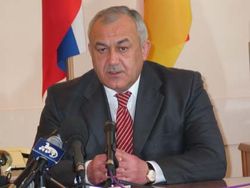
Russia and Ossetia: Divided Loyalties
Publication: Eurasia Daily Monitor Volume: 6 Issue: 153
By:

In a highly unusual move, the head of North Ossetia Taimuraz Mamsurov in an open letter on August 1 called on the governor of the neighboring Krasnodar region Alexander Tkachev to stop persecuting Ossetians in Sochi. Mamsurov cited the complaint that he had received from the Ossetian diaspora in this popular and wealthy Russian resort on the Black Sea. The address bluntly said: "In the course of the past several years in Sochi there has been a wave of abuse and intolerance toward the Ossetians, and cases of ethnic profiling have become routine." In particular Mamsurov referred to several cases of mass beatings, an attack on a leader of the diaspora and the killing of an Ossetian policeman in the city, which (according to the Ossetians) had not been properly investigated (www.region15.ru, August 1).
The Ossetians are the only predominantly indigenous orthodox believers in the North Caucasus and have traditionally been regarded as the most loyal people to Moscow in the region. This perception gained even more popularity after Russia claimed the right to interfere in South Ossetia in order to deliver the Ossetian people from Georgia’s assault in August 2008. However, on the anniversary of that event, the small Ossetian diaspora in Sochi addressed the heads of South and North Ossetia as well as the president and the prime minister of Russia to help them withstand local pressure. According to the address, police chiefs ordered officers "to imprison all the ‘insane’ Ossetians" (www.osinform.ru, July 25). The police, according to the complaint, privately advised the victims of abuse to get used to their practices as "it was time to clean up the city" (www.rosbalt.ru, July 25).
The ethnic profiling of Ossetians living in Russia is not a new phenomenon, however for the first time it has been officially acknowledged by the highest ranking official in North Ossetia. Moreover, the head of North Ossetia chose to address the governor of Krasnodar region in an open letter, instead of privately talking to him or alerting the relevant federal law-enforcement agencies. One obvious explanation might be that Mamsurov wanted to benefit politically, posing as "a defender of Ossetians," mimicking the Chechen leader Ramzan Kadyrov. Mamsurov’s first term in office expires in 2010.
However, since popular support is not needed in order to stay in power, Mamsurov probably did not require this type of publicity. Perhaps the only viable explanation for his frank statement is that the government institutions are so corrupt, in which case writing an open letter might be the only way of resolving this issue. An address on the eve of Russia’s claim of rescuing the South Ossetians from Georgia might have been a calculated move.
Krasnodar region has stood out as a glaringly intolerant society. Its population of over five million, 82 percent of whom are ethnic Russian, found it impossible to assimilate less than 15,000 Meskhetian Turks, launching a campaign of oppression against this minority. The pressure on the Meskhetian Turks in Krasnodar was so intense for over a decade, that Washington eventually established a special program for the Meskhetians to emigrate to the U.S. in 2004 (Novye Izvestia, March 17, 2004).
The Ossetians’ complaints are more puzzling, because an ethnic Ossetian, Taimuraz Bolloev was appointed as the head of Olimpstroi in June (Rossiyskaya Gazeta, June 8). Olimpstroi is the state corporation preparing Sochi and the local region for the winter Olympics in 2014. The event is seen by many as an intrinsically important project for Russia’s strongman, Prime Minister Vladimir Putin. Bolloev, the founder and former CEO of the Russian beer company Baltika in Saint Petersburg is reportedly close to Putin.
Despite their shared faith, top-level political connections, assumed loyalty and the political importance of the conflict in South Ossetia, it appears that the Ossetians have been targeted on the basis of their ethnic origin. One recent poll found that the peoples of the Caucasus still lead the ranking of peoples most disliked by Russians – 29 percent of Russians view them with irritation, far ahead of Americans (3 percent) (Interfax, August 3).
On August 8 Medvedev visited North Ossetia, his second visit to the region in less than one month. Women activists from the Voice of Beslan were stopped by the police, as they tried to enter the building in which Medvedev addressed Russian military personnel that had participated in the war with Georgia (Caucasian Knot, August 8). Voice of Beslan unites the victims of the school siege in Beslan in 2004, in which over three hundred people died (mostly children). These activists claim that the Russian government shared the blame for the death of the hostages along with the hostage takers.
Therefore, despite the outwardly positive appearance of Russia’s newly found role of "defender of small peoples," its image in North Ossetia is more complex, including several important grievances.




